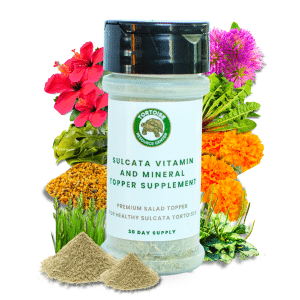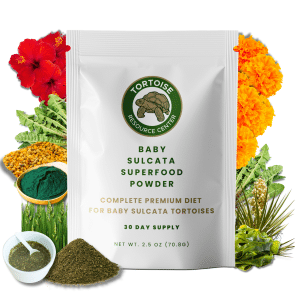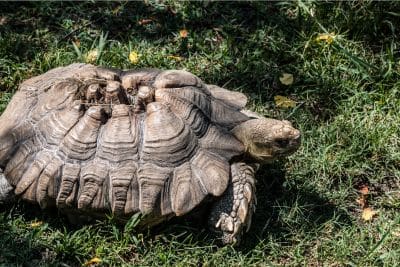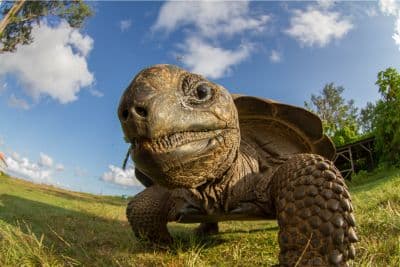Understanding tortoise poop and its role in health monitoring is fundamental to ensuring the well-being of your tortoise.
This article explores all the key characteristics surrounding tortoise poop. Understanding this delicate and often under-discussed subject means you’ll be equipped as a proactive and attentive caregiver, ensuring your tortoise enjoys a long and healthy life.
Understanding Tortoise Poop
Although tortoise poop can vary slightly depending on the species and diet, there are some general characteristics of healthy tortoise poop you can keep an eye out for.
Firstly, regular defecation is a sign of a healthy digestive system and healthy tortoise poop is typically brown or dark green in color. The consistency should be firm enough to hold its shape and not be overly sloppy or crumbly. It should also be free of blood, mucus and undigested food particles.
Generally, healthy poop is ovular or slightly elongated in shape. Tortoise poop will have a slight odor, but it shouldn’t be anything overly strong as they have an herbivorous diet.
Different tortoise species have evolved in diverse habitats with varying dietary preferences and digestive systems. This variability can lead to differences in poop characteristics.
Larger tortoises produce larger feces compared to smaller individuals. Some species naturally have firmer poop due to their specialized digestive systems adapted to processing tough vegetation. For example, desert tortoises often have drier and more compact poop due to their diet and the arid environments they inhabit.
Similarly, poop color varies depending on diet and species. Sulcata tortoises tend to have darker and more solid poop compared to other species.
Poop and Diet
Diet has a big influence on tortoise poop. Tortoises primarily feed on fibrous vegetation, which can affect the consistency and appearance of their poop.
High-fiber diets typically produce firmer and more structured poop. Conversely, low-fiber diets, such as those high in fruits or commercial pellets, result in looser stools.
The moisture content of the diet affects the hydration level of poop. Diets lacking in moisture can lead to drier, harder stools. Conversely, tortoises that eat a lot of succulent foods will have softer poop.
Finally, certain foods can influence the color of tortoise poop. Diets rich in dark green vegetables may produce darker-colored poop, whereas consumption of fruits can sometimes result in slightly different colors or textures in the poop.
A healthy diet that will result in normal feces is one high in fiber, calcium and water but low in protein, fat and phosphorus. The majority of a tortoise’s diet should be leafy greens, grass and hay, with around 10% being fruits and vegetables.
Health Indicators
Monitoring the characteristics of your tortoise’s poop can help you assess the overall health and well-being of your tortoise. Any significant changes to the norm may be an indicator of a health issue.
Look out for any of the following:
- Change in color
- Change in consistency
- Odor changes
- Abnormal rates
- Presence of food particles
- Presence of parasites
Common Problems and Solutions
Diarrhea is indicated by loose, watery stools that are being passed more frequently than normal. Diarrhea can be caused by dietary changes, bacterial or viral infections, parasites, stress or environmental factors.
If the diarrhea is caused by microorganisms, your tortoise will likely need to be given medication from a veterinarian. Otherwise, you can adjust the diet to less watery and easily digestible foods, and provide your tortoise with electrolytes to prevent dehydration from the loss of moisture.
Constipation is indicated by dry, hard stools that are difficult to pass. It can be caused by a low-fiber diet or dehydration.
The best way to treat constipation is to increase dietary fiber intake. I recommend soaking your tortoise daily to aid re-hydration and encourage exercise to get the digestive system moving.
Parasitic infections are indicated by visible worms in the stool, or changes in color, consistency or odor. Additionally, your tortoise may have visibly lost weight, have a decreased appetite and show lethargy.
Parasitic infections require a fecal examination by a veterinarian in order to identify the specific parasite and administer the correct treatment.
Practice good husbandry and maintain a clean and hygienic environment to prevent future cases.
Monitoring and Maintenance
As well as regular monitoring of your tortoise, I recommend keeping a close eye on their poop too. This will enable you to keep track of their digestive health and overall well-being and is easier to do than you might think, especially if you are exercising good husbandry skills by removing soiled substrate and replenishing water dishes daily.
Changes in poop color, consistency, or frequency can indicate underlying health problems such as infections, parasites, or dietary issues. Early detection allows for prompt veterinary intervention and treatment.
Poop characteristics reflect the tortoise’s diet and hydration status. Monitoring helps ensure the tortoise is receiving a balanced diet with adequate fiber, vitamins, and minerals, as well as maintaining proper hydration levels.
Regular monitoring also helps prevent serious conditions like constipation, diarrhea, or metabolic disorders from progressing, thereby improving the tortoise’s quality of life and longevity.
I recommend observing your tortoise’s poop daily and keeping a log diary to record your observations. This way, you can easily identify any changes.
You should also note any changes that occur in your tortoises’ diet, behavior or environment. This can help identify the underlying cause of any changes. If you do notice any concerning changes to your tortoise’s poop, consult a veterinarian. The earlier you catch and treat any issues, the better.
Cleaning and Hygiene
Maintaining a clean and hygienic environment is vital for your tortoise’s health. A clean habitat reduces the risk of bacterial, fungal and parasitic infections that can be harmful to your tortoise. Properly cleaning your tortoise’s enclosure will minimize the risk and spread of these microorganisms.
You should spot-clean your tortoises enclosure daily. This means removing poop promptly using gloves or a scooper.
In addition, tortoises do have a tendency to defecate in water – including their drinking vessel. As a minimum, clean the water bowl or dish daily or if sooner, as soon as you spot any feces in it. Replenish with fresh water thereafter.
I recommend deep cleaning your tortoises enclosure weekly. This involves using a reptile safe disinfectant and replacing all of the substrate. A clean and well-maintained habitat will help keep your tortoise comfortable and stress-free, contributing to its overall well-being and longevity.
Are You Starving Your Tortoise?
Save 10% on premium tortoise food and supplements from Tortoise Resource Center on Amazon now using code BUYNOWGET10

Sulcata Vitamin & Mineral Topper Supplement
30-Day Supply | 2 oz (56 g)
$24.99

Baby Sulcata Tortoise Superfood Powder
30-Day Supply | 2.5 oz (70.8 g) Bag
$24.99
Citations
- Tortoise Trust – Disinfection Protocols for Tortoise & Turtle Keepers
- American Tortoise Rescue – Desert Tortoise Care – Poop issues


